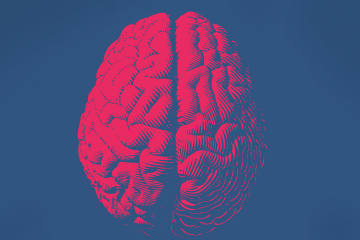Throughout her career, Tamar Rodney, an assistant professor at the Johns Hopkins School of Nursing, has committed herself to researching various forms of trauma. Through her psychiatric work in Baltimore and her research identifying the biomarkers of PTSD in veterans, Rodney has become an expert in determining the various ways we react to traumatic events.

Image caption: Tamar Rodney is a board-certified psychiatric nurse practitioner who has worked in trauma and psychiatry.
More than a year into a pandemic that has uprooted the lives of countless people, she says the risks for individuals developing post-traumatic stress disorder have never been higher.
Last week, Rodney presented "Trauma—The Wounds You Cannot See," the latest event in the Hopkins at Home Zoom lecture series, a series that itself sprang up during the pandemic to bring Hopkins experts to the community through virtual presentations. Rodney's presentation covered the impacts COVID-19 may have on the global psyche and ways to help manage or cope with stress related to the pandemic.
"If you have a cut, you put a Band-Aid on it, and everyone knows it is an area of tenderness and not to disturb it," Rodney said. "Now with mental health experiences, these scars still exist, but they are so deeply buried and they are not acknowledged many times, and it's assumed that an individual might be OK."
One of the unique challenges of addressing COVID-19-related trauma is the sheer omnipresence of the disease and the degree to which it has impacted our lives. Rodney says much research of trauma is based around the concept of trauma being a singular event that produces an outcome. The pandemic, on the other hand, has been an escalating series of events that have impacted our social, medical, and emotional lives.
"It's not just the grim final outcome of death," Rodney said. "There's a fear of getting it. There's a fear of losing connection with individuals. There's a fear of isolation. These are sacrifices people are making on a day-to-day level which are equally traumatic compared to the virus itself."
According to Rodney, PTSD can often be delayed for months or even years after the initial trauma. She said it's going to be important to keep an eye out for symptoms in others and ourselves. Rodney said the main four symptoms of PTSD are:
- Intrusion: When memories or concerns about trauma interrupt a flow of thought or emotional well-being
- Avoidance: Purposefully avoiding people, places, or things that remind you of the trauma
- Negative Mood: Reacting to life in a negative manner or not at all
- Hyper Arousal: Not in keeping with an individual's regular reactions, including difficulty sleeping, irritability, and difficulty concentrating
While vigilance will be needed to identify symptoms of PTSD, Rodney said there are a number of things we can do to help combat these feelings, including developing healthy coping systems like taking time out of our schedules, validating our feelings, limiting caffeine and alcohol, and attending therapy.
For her part, Rodney currently works with families recovering from substance use disorder, who are in a fragile place in their recovery due to extended isolation due to COVID. She says it's going to be important for providers to reprioritize patients' concerns, while treating symptoms caused by the pandemic, including anxiety, depression, and PTSD.
For those who find themselves struggling, the U.S Department of Veterans Affairs offers resources for those with COVID-inspired PTSD, and individuals can reach out to the Crisis Text Line by texting CONNECT to 741741.
Posted in Health
Tagged mental health, coronavirus, covid-19








